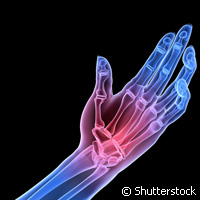Chronic pain gene identified
Scientists in Spain and the United Kingdom have discovered a gene responsible for regulating chronic pain. Published in the journal Science, the finding sheds new light on how drugs can be targeted to block the protein produced by the gene in order to fight chronic pain. The research was funded in part by a Marie Curie Actions grant of the EU's Seventh Framework Programme (FP7). University of Cambridge researchers, in cooperation with colleagues from the Department of Neuroscience, Centro de Investigación Biomédica en Red de Salud Mental (CIBERSAM), School of Medicine, University of Cádiz in Spain, say the rate of action potential firing in nociceptors is a major determinant of the intensity of pain. Around one Briton in seven suffers from chronic, or long-lasting, pain. The most common ailments are arthritis, back pain and headaches. Experts say chronic pain comes in two varieties: inflammatory pain and neuropathic pain. Inflammatory pain is a result of a persistent injury like arthritis or a burn, triggering enhanced sensitivity of pain-sensitive nerve endings. So people end up feeling a lot more pain. Neuropathic pain is the more intractable type of pain. Here, nerve damage produces continuous pain and sufferers are hypersensitive to stimuli. The researchers say that neuropathic pain, which could be a lifelong problem, affects many people but is hard to treat. For example, diabetics deal with neuropathic pain (there are 3.7 million people in Europe, Japan and the United States diagnosed with diabetes) as do sufferers of herpes zoster and cancer patients. Lower back pain patients are also neuropathic pain sufferers. 'Individuals suffering from neuropathic pain often have little or no respite because of the lack of effective medications,' says senior author Professor Peter McNaughton from the Department of Pharmacology at the University of Cambridge in the United Kingdom. 'Our research lays the groundwork for the development of new drugs to treat chronic pain by blocking HCN2.' The HCN2 gene is expressed in pain-sensitive nerve endings. While researchers have long recognised that the gene is expressed in pain-sensitive nerve endings, no one was able to elucidate how it plays a role in regulating pain... until now. They point out that because a related gene, HCN4, influences the control of the frequency of electrical activity in the heart, they believed that HCN2 would play a role in regulating the frequency of electrical activity in pain-sensitive nerves. For the purposes of their study, the team removed the HCN2 gene from pain-sensitive nerves. They later performed studies using electrical stimuli on these nerves in cell cultures to find out how their properties were changed when HCN2 was removed. 'Many genes play a critical role in pain sensation, but in most cases interfering with them simply abolishes all pain, or even all sensation,' Professor McNaughton says. 'What is exciting about the work on the HCN2 gene is that removing it - or blocking it pharmacologically - eliminates neuropathic pain without affecting normal acute pain. This finding could be very valuable clinically because normal pain sensation is essential for avoiding accidental damage.'For more information, please visit:University of Cambridge:http://www.cam.ac.uk/Science:http://www.sciencemag.org/
Countries
Spain, United Kingdom



